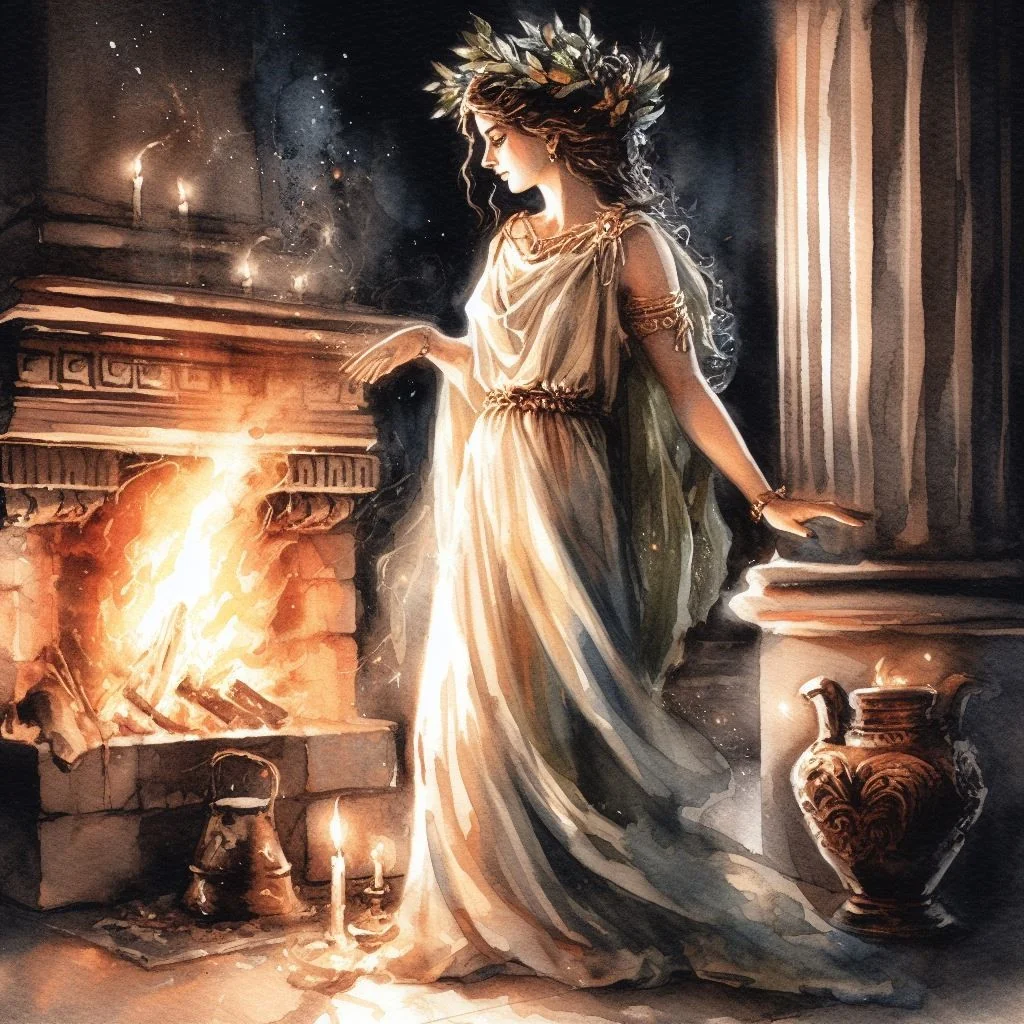Ever felt like you’re the glue holding your family together, yet nobody seems to notice? If so, you might find a kindred spirit in Hestia, the often-overlooked goddess of Greek mythology.

While Zeus was busy throwing thunderbolts and Athena was being, well, Athena, Hestia quietly kept the home fires burning—literally and figuratively.
Who is Hestia?
Hestia is the goddess of the hearth, home, and domesticity. Born to Titans Cronus and Rhea, she is the eldest sister of Zeus, Poseidon, Hades, Hera, and Demeter.
Known for her eternal virginity and commitment to the household, Hestia embodies stability and tranquility.
Unlike some of her more dramatic siblings, she opted out of the divine soap opera to focus on maintaining the sacred flame that kept both mortal and divine homes warm.
To get to know more about Hestia, check out www.judithlaura.com
The First and the Last
When Cronus devoured his children to prevent a prophecy, Hestia, being the firstborn, was the first to be swallowed and the last to be regurgitated. This unique position often symbolizes her place as both the beginning and end of things—a perpetual cycle of care and continuity.
Symbolism and Attributes
Hestia is most commonly associated with the hearth and its fire. In ancient Greece, every household and temple had a hearth dedicated to her.
She was also invoked during rituals and sacrifices as a guardian of the home. Her symbols include the kettle, hearth, and flame—all representing warmth, sustenance, and security.
Hestia’s Place Among the Olympians
Though she was one of the original Olympians, Hestia chose not to engage in the constant bickering and battles that characterized her siblings’ interactions.
Her calm demeanor and neutral stance earned her the role of mediator. In a family where grudges lasted centuries, Hestia’s impartiality was invaluable.
Passing the Torch
Hestia eventually gave up her seat among the Twelve Olympians to Dionysus, the god of wine and revelry.
This act wasn’t one of resignation but rather a testament to her humility and dedication to peace. By stepping aside, she maintained harmony among the gods and continued her guardianship over earthly hearths.
The Overlooked Heroine
Despite her importance, Hestia doesn’t get nearly as much airtime as some of her more glamorous counterparts.
This lack of recognition isn’t a reflection of her value but rather of the quieter, less dramatic nature of her influence. It’s a bit like being the middle child in a family of celebrities; your contributions are just as vital, even if they don’t make the headlines.
The Cultural Impact of Hestia
Hestia was honored in various festivals, the most notable being the “Prytaneia,” held at public hearths where eternal flames dedicated to her burned. These flames symbolized the unity and continuity of the community.
Households also began and ended meals with offerings to Hestia, ensuring her blessings were invoked daily.
Everyday Worship
Unlike other gods who required grand temples and complex rites, Hestia’s worship was simple and intimate.
Every home was her sanctuary, making her arguably the most personal deity in Greek religion. This closeness mirrored the essential, often unnoticed work of maintaining a home.
Modern Reflections
Even today, the concept of “keeping the home fires burning” resonates. In many cultures, the hearth remains a symbol of family, warmth, and stability.
Hestia’s legacy lives on in the everyday acts of love and care that keep households running smoothly.
Hestia’s role in Greek mythology may not come with the drama and excitement of some of her divine counterparts, but her influence is no less significant. She embodies the values of humility, service, and the quiet strength that comes from maintaining the hearth and home.



